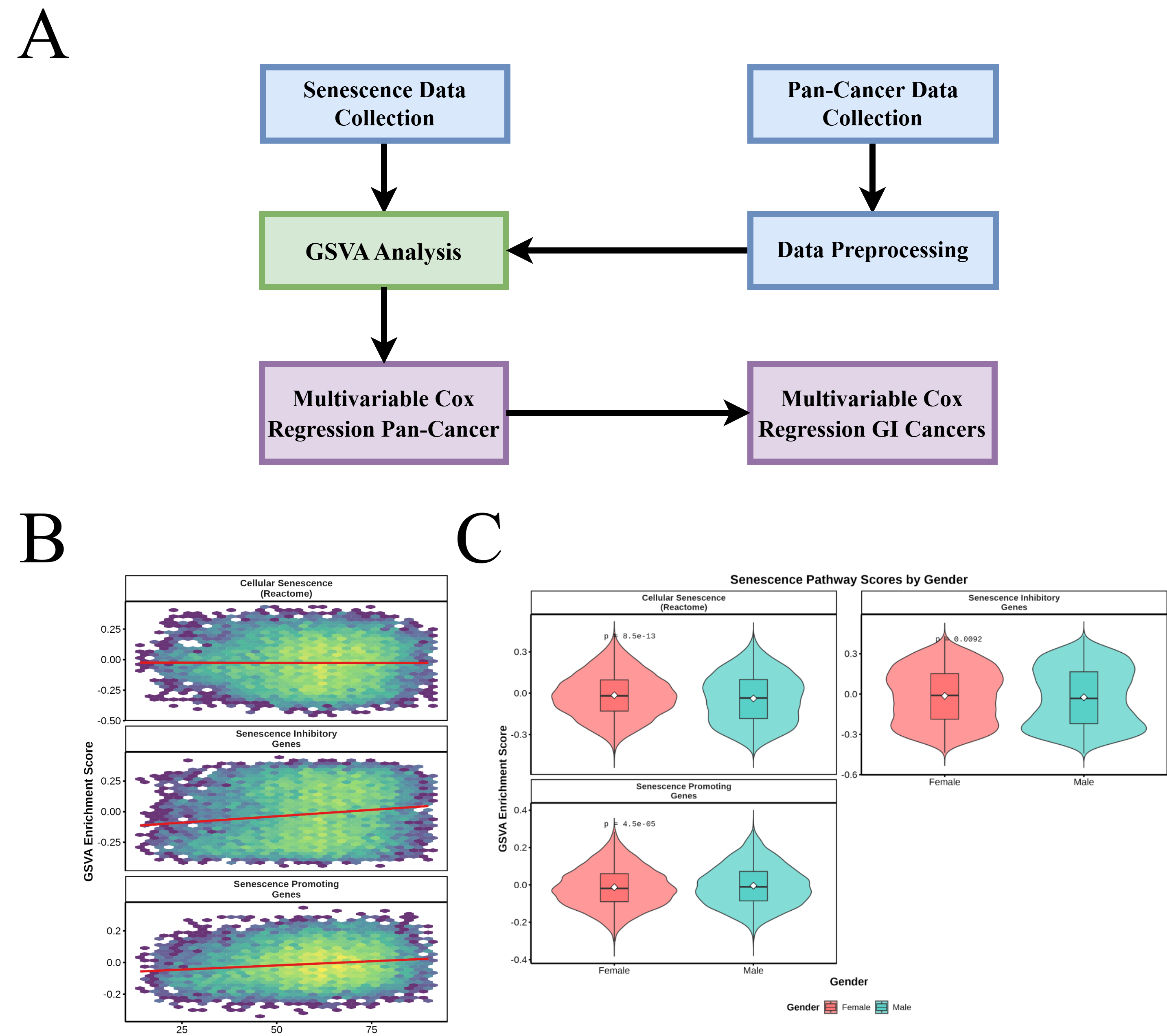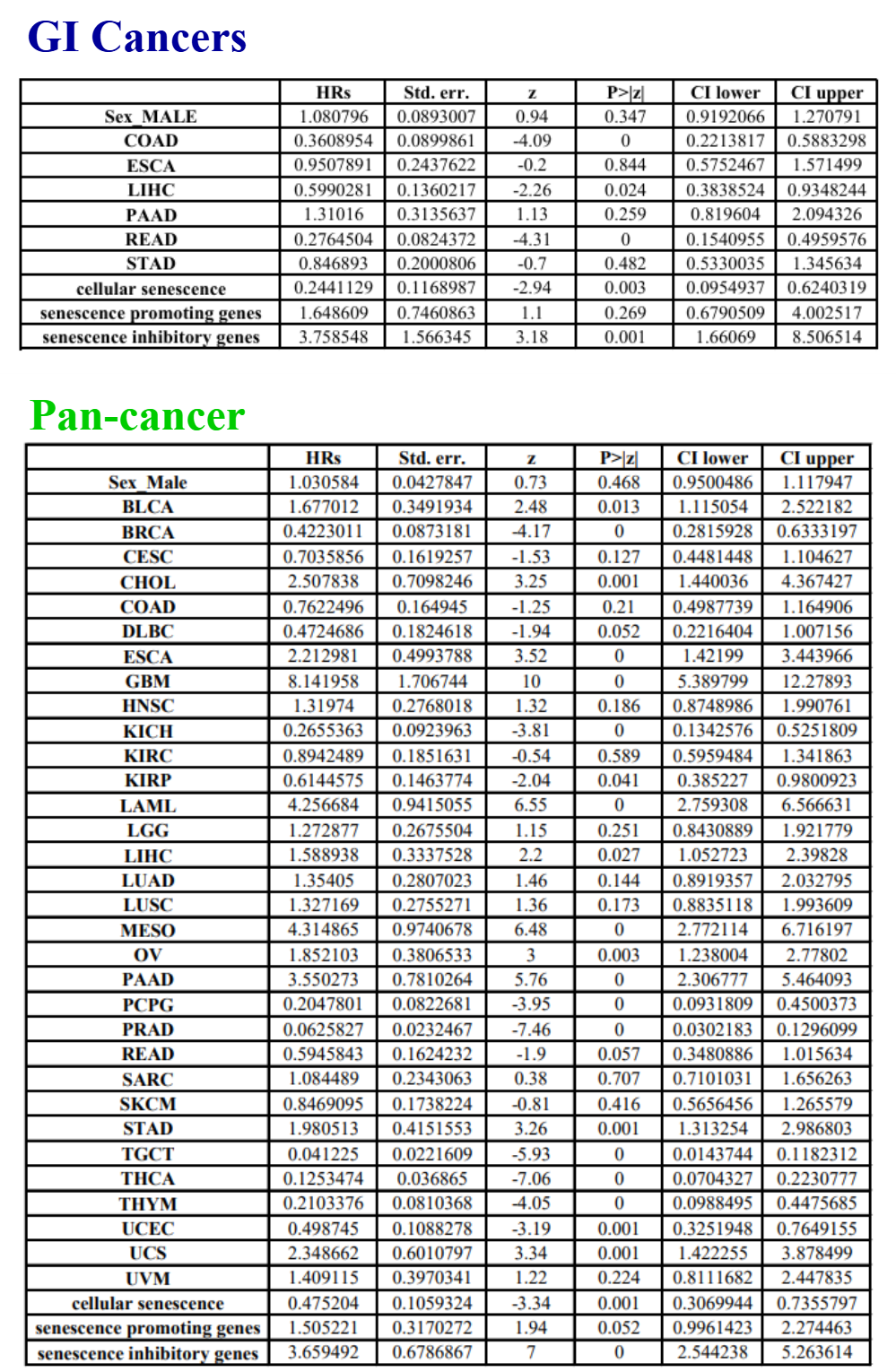Tuesday Poster Session
Category: Biliary/Pancreas
P4366 - Cancer-Aging Interplay via Senescence Hallmarks: Insights to GI Tumor Mechanisms
Tuesday, October 28, 2025
10:30 AM - 4:00 PM PDT
Location: Exhibit Hall
- ST
Salar Tofighi, MD
Saint Agnes Medical Center
Fresno, CA
Presenting Author(s)
Mahdi Malekpour, MD1, Farzad Midjani, MD1, Hadi Darzi Ramandi, PhD2, Seyed Reza Abdipour Mehrian, MD1, Leila Kianmehr, PhD3, Fahimeh Golabi, MD1, Shirin Fathi, PharmD1, Salar Tofighi, MD4, Mohammad Taheri, PhD5
1Shiraz University of Medical Sciences, Shiraz, Fars, Iran; 2Agricultural Research Education and Extension Organization (AREEO), Tehran, Tehran, Iran; 3Erciyes University, Kayseri, Kayseri, Turkey; 4Saint Agnes Medical Center, Fresno, CA; 5Shiraz University, Shiraz, Fars, Iran
Introduction: Senescence known as cell arrest state is a recently recognized hallmark of cancer and a well-established hallmark of aging. Both protective and tumor-promoting nature of senescence is becoming increasingly apparent. This study explores the impact of senescence-associated gene sets across pan-cancer datasets to better understand their influence on cancer progression and patient survival.
Methods: Batch effect-normalized data of 11,060 patients and 12,591 curated clinical records were downloaded from XenaBrowser. Cellular senescence pathway obtained from Reactome, curated senescence-promoting and -inhibitory genes from CellAge, and CRISPR-Cas9-validated drivers from AgingAtlas. The senescence promoting gene of CellAge and AgingAtlas merged. Expression data were intersected with clinical data, retaining only samples with ID, age, gender, and cancer type, and then preprocessed. GSVA analysis was performed based on each pathway. GSVA results were correlated with age, and differences between gender groups were identified. Multivariable Cox regression models, adjusting for GSVA scores, gender, and cancer type, assessed survival associations in pan-cancer and GI cancer subsets.
Results: Missing data (0.01%) were imputed using the sample mean expression. After intersecting expression and clinical datasets, 10,813 samples with complete information were retained. Correlations between GSVA scores, age, and gender are presented in Figure 1. Pan-cancer Cox models revealed variable hazard ratios (HRs), prompting a focused analysis on gastrointestinal (GI) cancers. After adjusting for gender and senescence pathway activity, HRs decreased in most GI cancers, except pancreatic ductal adenocarcinoma (PDAC), suggesting a protective role of senescence in GI cancers. In contrast, upregulation of senescence-inhibitory pathways was associated with increased HRs, indicating poorer survival. The merged senescence-promoting gene set showed no significant effect, possibly reflecting time-dependent variability and the complex role of this pathway. Notably, the core senescence pathway itself demonstrated a protective effect in GI cancers.
Discussion: Our study demonstrates that senescence exerts diverse effects across cancer types but has a significant impact on patient survival. Given its strong influence, senescence-related factors hold potential as prognostic biomarkers; however, further cancer-specific and personalized investigations are warranted.

Figure: A. Flow diagram of study, B. Correlation of senescence pathways activity and age, C. Gender difference in different senescence pathways

Figure: Cox Regression Analysis
Disclosures:
Mahdi Malekpour indicated no relevant financial relationships.
Farzad Midjani indicated no relevant financial relationships.
Hadi Darzi Ramandi indicated no relevant financial relationships.
Seyed Reza Abdipour Mehrian indicated no relevant financial relationships.
Leila Kianmehr indicated no relevant financial relationships.
Fahimeh Golabi indicated no relevant financial relationships.
Shirin Fathi indicated no relevant financial relationships.
Salar Tofighi indicated no relevant financial relationships.
Mohammad Taheri indicated no relevant financial relationships.
Mahdi Malekpour, MD1, Farzad Midjani, MD1, Hadi Darzi Ramandi, PhD2, Seyed Reza Abdipour Mehrian, MD1, Leila Kianmehr, PhD3, Fahimeh Golabi, MD1, Shirin Fathi, PharmD1, Salar Tofighi, MD4, Mohammad Taheri, PhD5. P4366 - Cancer-Aging Interplay via Senescence Hallmarks: Insights to GI Tumor Mechanisms, ACG 2025 Annual Scientific Meeting Abstracts. Phoenix, AZ: American College of Gastroenterology.
1Shiraz University of Medical Sciences, Shiraz, Fars, Iran; 2Agricultural Research Education and Extension Organization (AREEO), Tehran, Tehran, Iran; 3Erciyes University, Kayseri, Kayseri, Turkey; 4Saint Agnes Medical Center, Fresno, CA; 5Shiraz University, Shiraz, Fars, Iran
Introduction: Senescence known as cell arrest state is a recently recognized hallmark of cancer and a well-established hallmark of aging. Both protective and tumor-promoting nature of senescence is becoming increasingly apparent. This study explores the impact of senescence-associated gene sets across pan-cancer datasets to better understand their influence on cancer progression and patient survival.
Methods: Batch effect-normalized data of 11,060 patients and 12,591 curated clinical records were downloaded from XenaBrowser. Cellular senescence pathway obtained from Reactome, curated senescence-promoting and -inhibitory genes from CellAge, and CRISPR-Cas9-validated drivers from AgingAtlas. The senescence promoting gene of CellAge and AgingAtlas merged. Expression data were intersected with clinical data, retaining only samples with ID, age, gender, and cancer type, and then preprocessed. GSVA analysis was performed based on each pathway. GSVA results were correlated with age, and differences between gender groups were identified. Multivariable Cox regression models, adjusting for GSVA scores, gender, and cancer type, assessed survival associations in pan-cancer and GI cancer subsets.
Results: Missing data (0.01%) were imputed using the sample mean expression. After intersecting expression and clinical datasets, 10,813 samples with complete information were retained. Correlations between GSVA scores, age, and gender are presented in Figure 1. Pan-cancer Cox models revealed variable hazard ratios (HRs), prompting a focused analysis on gastrointestinal (GI) cancers. After adjusting for gender and senescence pathway activity, HRs decreased in most GI cancers, except pancreatic ductal adenocarcinoma (PDAC), suggesting a protective role of senescence in GI cancers. In contrast, upregulation of senescence-inhibitory pathways was associated with increased HRs, indicating poorer survival. The merged senescence-promoting gene set showed no significant effect, possibly reflecting time-dependent variability and the complex role of this pathway. Notably, the core senescence pathway itself demonstrated a protective effect in GI cancers.
Discussion: Our study demonstrates that senescence exerts diverse effects across cancer types but has a significant impact on patient survival. Given its strong influence, senescence-related factors hold potential as prognostic biomarkers; however, further cancer-specific and personalized investigations are warranted.

Figure: A. Flow diagram of study, B. Correlation of senescence pathways activity and age, C. Gender difference in different senescence pathways

Figure: Cox Regression Analysis
Disclosures:
Mahdi Malekpour indicated no relevant financial relationships.
Farzad Midjani indicated no relevant financial relationships.
Hadi Darzi Ramandi indicated no relevant financial relationships.
Seyed Reza Abdipour Mehrian indicated no relevant financial relationships.
Leila Kianmehr indicated no relevant financial relationships.
Fahimeh Golabi indicated no relevant financial relationships.
Shirin Fathi indicated no relevant financial relationships.
Salar Tofighi indicated no relevant financial relationships.
Mohammad Taheri indicated no relevant financial relationships.
Mahdi Malekpour, MD1, Farzad Midjani, MD1, Hadi Darzi Ramandi, PhD2, Seyed Reza Abdipour Mehrian, MD1, Leila Kianmehr, PhD3, Fahimeh Golabi, MD1, Shirin Fathi, PharmD1, Salar Tofighi, MD4, Mohammad Taheri, PhD5. P4366 - Cancer-Aging Interplay via Senescence Hallmarks: Insights to GI Tumor Mechanisms, ACG 2025 Annual Scientific Meeting Abstracts. Phoenix, AZ: American College of Gastroenterology.
